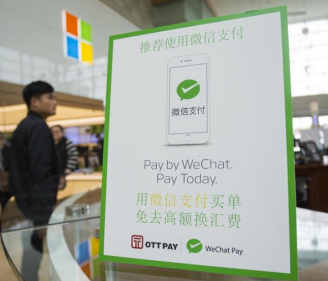 Citcon, the integrated payment and marketing platform, announced a strategic partnership to enable brands in North America to accept WeChat Pay and Alipay.
Citcon, the integrated payment and marketing platform, announced a strategic partnership to enable brands in North America to accept WeChat Pay and Alipay.
WeChat Pay and Alipay are the most popular and convenient payment options for Chinese consumers to purchase goods and services. Adding these payment options to retail point of sale allows brands to now tap into an even larger revenue stream from Chinese consumers who are the largest spender, and fastest growing traveler segment to the North America. The platform enables brands to optimize revenue growth without the costs and hassles of establishing a business entity in China.
WeChat Pay is a fully integrated payment solution within WeChat, the world’s most popular mobile social communications service with 936 million active users and Alipay is a super lifestyle app run by Ant Financial Services Group with more than 450 million active users. Together these platforms jointly account for 90% of China’s mobile payment market share. Both super apps allow users to book a trip, hail a taxi, order food, purchase movie tickets, pay for water and electricity bills, manage investments, perform transactions on e-commerce websites and more to create a cashless society.
“China is changing fast. Mobile payment is the new frontier of commerce and China is leading this trend. By providing an integrated and easy-to-use payment solution, Citcon is creating a future that takes payment and marketing to the next level, empowering global merchants to drive business growth with millions of Chinese consumers.”said Chuck Huang, Founder and CEO of Citcon
As the first payment partner of WeChat Pay and Alipay, in addition to major credit cards such as UnionPay, MasterCard, Visa, Discover and American Express, Citcon is a one-stop shop for merchants to connect with Chinese consumers and accept payments anywhere. Citcon’s stand-alone mobile point-of-sale (mPOS), easy-to-integrate API and software products empower merchants to optimize growth both online and offline, with an easy and affordable rate compared to credit card processing. In addition to the convenient payment solutions, merchants will also be able to gain in-depth consumer behavior insights, manage business performance, run marketing campaigns, guides users to merchants stores while saving their shopping preferences for future visits and manage lifetime customer loyalty programs.
“Accepting WeChat Pay is a smart move for U.S. Retailers. That will definitely help with the category of budget-conscious Chinese travelers who choose to travel in groups. But they must keep in mind that the most affluent categories prefer to pay with their international credit cards, who show their status when traveling overseas and offer more perks in terms of miles and reward points.” commented Pierre Gervois, CEO of China Elite Focus Magazines LLC, a media group specialized in luxury travel publications for very affluent Chinese outbound travelers.
Source: Citcon

 .”
.”